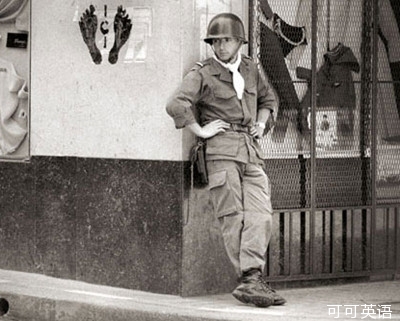Books and Arts; Book Review;Algeria and France;War by any other name;
文藝;書評;阿爾及利亞與法國;冠以他名的戰爭;
Algeria: France's Undeclared War. By Martin Evans.
《阿爾及利亞:法國未承認的戰爭》。作者馬丁·伊凡斯。
In 2006 Francois Hollande, now the Socialist Party's candidate in France's forthcoming presidential election, declared “in the name of the Socialist Party” that the Section Francaise de l'Internationale Ouvrière, the forerunner of his party, “lost its soul in the Algerian War. It had its justifications but we still owe an apology to the Algerian people.”
2006年,弗朗瓦索·奧朗德,當前法國即將到來的總統大選的社會黨候選人,宣稱“工人國際法國分部”,他的黨派的前身,“在阿爾及利亞戰爭中喪失了靈魂。這場戰爭有正當的理由但我們依舊欠著阿爾及利亞人民一個道歉。”

Indeed so. It was a Socialist prime minister, Guy Mollet, who in 1956 ordered a campaign of “pacification” against Algeria's nationalists. Opposed to colonialism, Mollet may well have acted out of good intentions, but “pacification” amounted to repression and countless acts of brutality and torture by the French army.
的確如此。正是社會黨的總理蓋伊·莫勒在1956年下令對阿爾及利亞的民主主義者采取“和諧”運動。反對殖民主義的莫勒很可能出于好心,但法軍執行的“和諧”只相當于鎮壓和數不清的暴行和折磨。
But Martin Evans, a British academic, is too good an historian to present a one-sided story of Algeria's quest for independence. The insurgent Front de Libération Nationale (FLN) was ruthless in its determination to be the sole representative of Algerian nationalism, willing to kill and maim not just French settlers but also the rival nationalists of Messali Hadj's Mouvement National Algérien. The cruelty was exercised even within the FLN's own ranks, witness the cold-blooded strangling of Abane Ramdane or the assassination of Mohamed Khider, another of its leading figures.
但馬丁·伊凡斯,一位英國學者,作為一位優秀的歷史學家不會只單方面描寫阿爾及利亞追求獨立的故事。叛亂的“民族解放陣線”(FLN)為實現其成為阿爾及利亞民族運動的唯一代表的野心可謂冷酷無情,不只是愿意殺害和重傷法國移民,就連對民族主義陣營的競爭對手,梅薩麗·哈吉的“阿爾及利亞民族運動組織”也是如此。這種殘忍甚至也在FLN的內部等級中踐行,參見其對刺殺了FLN領袖人物穆罕默德·海德爾的阿班·拉姆丹實行的冷血絞刑。
Mr Evans's title reminds the reader that the Algerian conflict was officially only a “police operation”. Recognition that it was a full-scale war, France's worst conflict since the second world war, came only with a vote by the National Assembly in 1999, some 37 years after Algeria's independence. But the thoroughness of this book is that it traces the origins of the war all the way back to the French invasion of 1830. What followed were dismal decades of discrimination, poverty and famine.
伊凡斯的頭銜提醒讀者,阿爾及利亞的爭端官方來說只是一次“警務行動”。一直到阿爾及利亞獨立37年之后,才隨著1999年國民大會的投票承認“這是一場徹底的戰爭、法國自從二戰以來最嚴重的一次沖突”。但這本書的透徹之處在于,它將戰爭的根源一路追溯到了1830年的法國入侵。隨之而來的是充斥著種族歧視、貧窮和饑荒的黑暗的數十年。
In retrospect, it is hard to see how metropolitan France could ever have imagined a secure and peaceful hold on “French Algeria”. Once the war erupted, there was never much hope that France's politicians, from Mollet through to Charles de Gaulle, could win Muslim Algerian “hearts and minds”. Nor could they win the trust and support of the European settlers, the pieds noirs (literally “black feet”, see picture above) whose sense of betrayal led them to side with the futile rebellion against de Gaulle by the dissident French soldiers of the OAS (Organisation de l'Armée Secrète).
回顧過去,很難明白大國法蘭西何以幻想能安全和平地掌控“法屬阿爾及利亞”。自從戰爭爆發,法國政治家從莫勒到查爾斯·德·高爾,從來就沒有什么希望能贏得阿爾及利亞穆斯林的“衷心和理解”。他們也不可能贏得歐洲移民的信任和支持,法國僑民(字面為“黑腳”,見上圖)的背叛意圖讓他們與異見的OAS(Organisation de l'Armée Secrète)法國士兵一同站在了對抗德·高爾的無望的反叛軍一方。
As Mr Evans describes, it was not just Algeria's history that militated against it being an inseparable part of the French nation, but also the context of contemporary geopolitics. The tide of anti-colonialism after the second world war was forcing Europe's imperial powers to grant independence almost everywhere. France had already been defeated in Vietnam; Britain's prime minister Harold Macmillan talked of the “wind of change” sweeping across Africa; and America's President Eisenhower swiftly compelled France (which accused Egypt's Gamal Abdel Nasser of aiding the FLN), Britain and Israel to pull back from their 1956 seizure of the Suez Canal. The implications were recognised by de Gaulle: if France were to be a power to be reckoned with in a world now defined by the cold war, it had to rid itself of the Algerian millstone—whatever the objections of the settlers who would then have to seek refuge in France.
正如伊凡斯描述的,不僅是阿爾及利亞的歷史阻止其成為法國不可分割的一部分,同樣也有當前的地緣政治環境的影響。二戰之后的反殖民主義浪潮迫使歐洲的帝國主義勢力承認幾乎所有殖民地的獨立。法國已經在越南被打敗;英國首相哈羅德·麥克米蘭談到席卷非洲的“變幻之風”;美國總統艾森豪威爾迅速強迫法國(該國指控埃及的賈麥爾·阿卜杜勒·納賽爾資助FLN)、英國和以色列從他們1956年控制的蘇伊士運河撤回。德·高爾讀出了這些暗示:如果法國要在我們今天稱為冷戰時期的世界作為一個大國得到認同,就必須放下阿爾及利亞的包袱·不管移民如何抱怨,都不得不到法國尋求庇護。
But what of today? Mr Evans's excellent book is marred only by the occasional editing error (ORAF, the Organisation of the French Algerian Resistance, exists only as an acronym, and Mr Evans, when talking of the founding members of the European Economic Community, omits the Netherlands). It ends with a somewhat depressing postscript chapter.
但今日何如?除了偶爾出現的筆誤(ORAF,法屬阿爾及利亞抵抗組織,在書中只以縮寫出現,并且伊凡斯在說到歐洲共同市場的創立成員國的時候省略了荷蘭),以及這本書以一個稍微令人沮喪的后記章節收尾。伊凡斯優秀的著作可謂瑕不掩瑜。
In France, citizens of Algerian and other north African descent are disproportionately poor and discriminated against; at times their young, caught between two different cultures, react with violence, as in the urban upheavals of 2005. As Mr Evans says: “The riots of 2005 were just one example of how the legacy of the Algerian war is still being played out.” Meanwhile, in Algeria itself, the country struggles with the aftermath of another undeclared war: the brutal repression by the army of the Islamist forces who two decades ago were about to be voted into office.
在法國,阿爾及利亞以及其他北非族裔的公民不成比例地貧窮和受到歧視;有時他們的年輕一代,夾在兩種不同的文化之間,會以暴力的方式應對,正如2005年的城市暴動那樣。正如伊凡斯所說:“2005年的騷亂只是阿爾及利亞戰爭的遺留的延續。”同時,在阿爾及利亞本土,該國也掙扎于另一場未承認的戰爭:軍隊對二十年前即將通過投票進入政府的伊斯蘭勢力的殘酷鎮壓。












